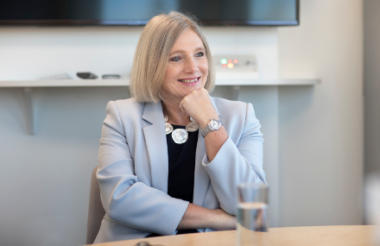The Charity Commission has not seen the increase in mergers that it expected to see as a result of the pandemic, according to its chief executive.
Helen Stephenson, chief executive of the Charity Commission, was speaking at the ICAEW Virtual Charity Conference 2021.
She was asked whether she would like to see more consolidation in the sector, and said: “We thought initially that there might be more consolidations, that there might be more mergers, and so worked on making sure all of our guidance was up to date.”
However, this has not yet come about.
Stephenson added that “we would not as a regulator opine on who should merge with who” but noted where she has seen positive examples of mergers, organisations have put beneficiaries and purpose at the forefront of their decision making.
These organisations have remained in a strong place during the pandemic, where they “may have struggled as individual organisations”.
Stephenson also told delegates that she had seen “far better partnership work across the sector” during the pandemic, and added she hopes this remains post-Covid-19.
Increase in 'fractured relationships'
After the initial onset of the crisis, the Commission has, however, seen an upturn in the amount of “fractured relationships”. These are manifesting themselves as disputes between trustees or problems within organisations.
Stephenson’s personal view, rather than a Commission view, is: “Cracks or stresses in organisations have probably existed before the pandemic, and have become even stronger during the pressure that people are facing trying to get through this.”
She added: “We have also seen an upturn in some quite difficult cases coming through to us.”
‘We are seeing some indicators of the financial shocks’
Stephenson said at some point there would be a “slow and difficult process of recovery and renewal ahead” but told delegates “sadly we are not quite in that recovery phase yet”.
Indeed, “the pandemic continues to rage taking a complex, varied, and in some cases devastating toll on the charity sector”.
She noted that many charities have seen “demand for their services skyrocket just as they are having to make painful decisions to reduce their offers or suspend their work entirely”.
She emphasised: “We do not know yet what the full scale of the pandemic will be, and it could be months or years before we realise the true nature of the impact of the crisis on the shape and size of the sector.”
Indeed, Stephenson said the Commission is “seeing some indicators of the financial shocks to the sector starting to come through”. This is in terms of auditors reports or other reporting from finance professionals through the accounting processes.
However it is not yet seeing an increase in the numbers of organisations who are becoming insolvent or removing themselves from the register.
Emphasis on serving in the public interest not ‘just a passing fashion’
Stephenson said: “Some in the sector may have hoped that the Commission’s explicit and vocal focus on serving in the public interest was just a passing fashion, far from it.”
The Commission’s statutory objective “to increase, not maintain,” public trust in charities remains.
Yet at the Commission itself, “our work has been challenged and changed by the pandemic”, Stephenson said.
The Commission will “continue to put the public and public interest at the heart of everything we do” as legitimacy and trust are the “lifeblood” of the charity sector.
Stephenson added that being a leader in this time involves “very much living on your wits” and “building a flexible organisation that can respond and change in an instant”.
This marks the second year of the Commission implementing its strategy. One priority was “to be open for business” and let it be known the Commission is here to provide a service.
She said the Commission has made progress by investing in its contact centre. During the first lockdown, its contact centre “did not miss a beat” and has helped 43,000 customers since March.
She added the Commission has strengthened its approach to dealing with whistleblowing reports and has a more efficient way for serious incidents to be reported via an online form, saving time for the charities involved.
Nonetheless, Stephenson recognised its guidance has not always been accessible to all. She said: “We know charities do not always find out gov.uk site easy to navigate and our guidance in the past has not been as accessible and focused as it now needs to be.”
Stephenson claimed that the Commission has “made big strides in recent months” and referenced its new five minute guides.
She said: “We cannot just respond to catastrophes in individual charities or scandals impacting the sector. We must help charities prevent issues developing into crises in the first place.”
Stephenson vowed to “think creatively” and told delegates to “expect to see some innovative work coming out of the Commission in the months and years ahead”.
Stephenson also committed to deal swiftly with permissions casework and reducing short term regulatory hurdles which may get in the way of charities responding to urgent need, where it can.
For example, the facility allowing charities to apply for a postponement of their annual reporting deadline will not be coming to an end “imminently”.
Related articles
Helen Stephenson: Covid-19 highlights the lifeline that charities are to so many – and we are playing our part as regulator
Helen Stephenson from the Charity Commission reflects on the sector's response to the coronavirus crisis and explains what the regulator is doing to help.












